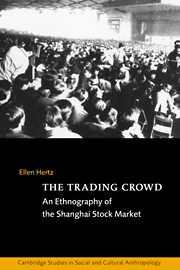Book contents
- Frontmatter
- Contents
- List of illustrations
- Preface
- Acknowledgments
- List of abbreviations
- Conversion rate
- Introduction: Ways and means
- Part I
- Part II
- 5 The big players (dahu)
- 6 The dispersed players (sanhu)
- 7 Guojia: The rise and fall of a super-player
- 8 Conclusion: The trading crowd
- 9 Afterwords
- Glossary of Chinese terms
- Bibliography
- Index
- More titles in the Cambridge Studies in Social and Cultural Anthropology series
7 - Guojia: The rise and fall of a super-player
Published online by Cambridge University Press: 05 June 2012
- Frontmatter
- Contents
- List of illustrations
- Preface
- Acknowledgments
- List of abbreviations
- Conversion rate
- Introduction: Ways and means
- Part I
- Part II
- 5 The big players (dahu)
- 6 The dispersed players (sanhu)
- 7 Guojia: The rise and fall of a super-player
- 8 Conclusion: The trading crowd
- 9 Afterwords
- Glossary of Chinese terms
- Bibliography
- Index
- More titles in the Cambridge Studies in Social and Cultural Anthropology series
Summary
The allegory of the Chinese stock market in 1992 begins and ends with “the State.” In chapter 2, we examined the structural position of the state tributary system in the formation and regulation of the market for shares in Shanghai. In this chapter, we examine “the State” in action – the ways in which it used this tributary power during the speculative cycle of 1992 – and ask what this examination tells us about how “the State” conceives of itself and how it is conceived of by “the People.” The best picture of the state as social actor can be given through a blow-by-blow description of the market's rises and falls over the course of 1992, a description which pays special attention to the language – both official and “counter-cultural” – in which this cycle was articulated.
As usual, a note of caution is necessary at the outset. I have translated “guojia” simply as “State,” as is the standard practice. However, the connotations of the Chinese use of the term “guojia” merit a study in their own right. “Guojia” – literally “the national family” – has a standard translation in “country, state, nation” (The Commercial Press, A Chinese–English Dictionary). In the discourse surrounding the stock market, however, guojia refers to the Party/State and its leaders, or at least all of those leaders in Beijing or Shanghai with authority to make policy decisions.
- Type
- Chapter
- Information
- The Trading CrowdAn Ethnography of the Shanghai Stock Market, pp. 174 - 187Publisher: Cambridge University PressPrint publication year: 1998

